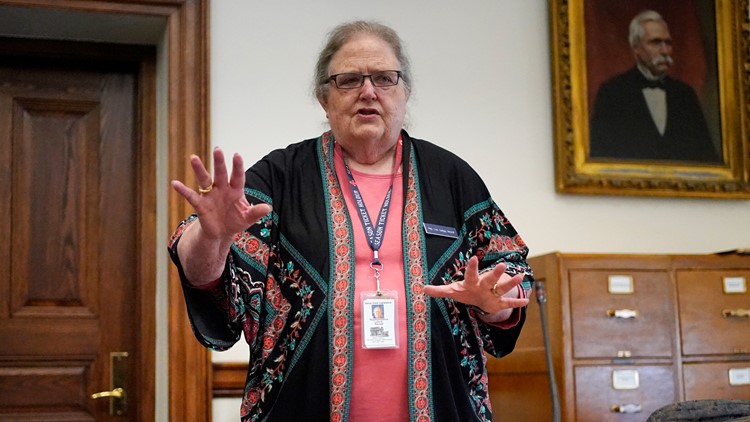PORTLAND, Maine — A feminist lawmaker who has been pressing for the Equal Rights Amendment for five decades came up short in her final effort before leaving the Maine Legislature.
Rep. Lois Galgay Reckitt, 78, was weary and resigned — and frustrated — as she was stymied yet again by her proposal's failure to win a two-thirds majority in the House on Wednesday.
“It’s a done deal for this session, and for my career,” said Reckitt, D-South Portland. “I thought that was going to be my signatory thing for my eight years in the Legislature, but it's not going to be.”
Reckitt is renowned as a relentless activist on behalf of women.
She served as the longtime director of Family Crisis Services in Portland and an advocate for women suffering from domestic abuse. She was a board member with the National Organization for Women and a founder of the Human Rights Campaign Fund. She helped to found the Maine Women’s Lobby.
All along, she was advocating for the Equal Rights Amendment, first at the national level, seeking to amend the U.S. Constitution, and later at the state level, seeking to amend the Maine Constitution.
She failed three times previously in the Legislature. This time around, she broadened the scope of her proposal to ban discrimination against a series of groups, not just women, in the hopes of bringing more support and protecting more people by aligning language with the Maine Human Rights Act.
The strategy garnered support, and new opposition, during a spirited public hearing in April.
Many opponents focused on how the amendment could affect abortion, and others raised concerns about transgender people using bathrooms. The Roman Catholic Diocese of Portland was among the groups opposing the amendment.
Reckitt, who was inducted into the Maine Women’s Hall of Fame in 1998, still holds out hope that another bill she championed — partially decriminalizing prostitution — will be signed by the governor. She said the bill will help women pushed into prostitution by desperate circumstances.
As for the Equal Rights Amendment, she knew the outcome before the votes were cast. But that didn't keep her from making a final pitch to colleagues. “I pride myself on being a very determined person," she told them. “Deserting my core beliefs like equality is not in my playbook.”
Democrats control both chambers of the Legislature, but Republican support was needed to reach the two-thirds majority threshold. If approved, Maine voters would have had the final say in a referendum vote on whether they want to adopt language prohibiting discrimination based on race, color, religion, sex, sexual orientation, gender identity, gender expression, age, physical or mental disability, national origin or ancestry of an individual.
At the federal level, Congress passed the Equal Rights Amendment in 1972. The necessary approval of three-quarters of the states eventually happened but not in time to meet a deadline for the amendment to be passed. In April, U.S. Senate Republicans blocked a Democratic measure to revive the amendment.
“The ERA is, thankfully, an idea that has outlived its usefulness after fifty years,” Rep. Heidi Sampson, R-Alfred, said before the vote, arguing the amendment was unnecessary.
She noted women serve as U.S. vice president and, in Maine, as a U.S. senator, governor, House speaker, and in seven out of 10 leadership positions in the Maine Legislature. “Women today are empowered and do not need an amendment that implies there are limitations to what we can achieve,” she said.
Reckitt insists her proposal is still needed and would be easily passed in a referendum — if only two-thirds of state lawmakers would get on board for the amendment.
Dania Bowie, development and communications coordinator from the Maine Women’s Lobby, said she respects that Reckitt has continued to be a tireless fighter, even while battling illness. Reckitt has chronic obstructive pulmonary disease and is a cancer survivor who still reports each day to the Legislature.
“She’s a spitfire. She’s ready to roll, even when she’s not feeling so well,” Bowie said. “She’s been a relentless and ahead-of-her-time advocate for women and LGBTQ community.”
Democratic Rep. Holly Sargent, D-York, called Reckitt an “indefatigable” lawmaker and “chief advocate, unswerving warrior on this issue of equal rights for women since 1978."
“Her colleagues thank her and pledge that we will not give up a fight that many of her colleagues will pick up the torch as long as it takes,” Sargent said.
Reckitt said she will turn 80 by the time her term ends next year because of term limits. While resigned to losing the final fight, she said she will be back, as a citizen, to testify in support of it again in the future.
“I won’t be shut up on this issue until I don’t have any voice anymore. And that won’t happen until I’m in the grave,” she said.



